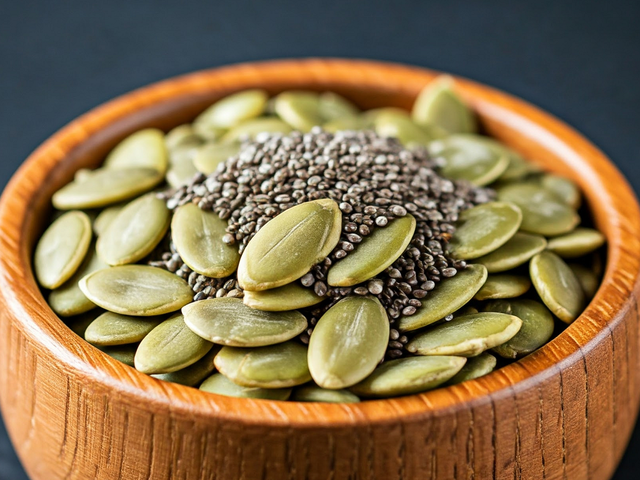A study published in the American Heart Journal found that people with low blood magnesium levels have a higher risk of dying from heart disease. This shows that magnesium plays an important role in heart health, according to the health website Medical News Today (UK).
Pumpkin seeds and chia seeds help improve blood pressure thanks to their high magnesium content
PHOTO: AI
The National Institutes of Health recommends that men consume 400 to 420 mg of magnesium daily, while women consume 310 to 320 mg. A study published in the European Journal of Clinical Nutrition found that consuming 370 mg or more of magnesium daily reduced both systolic and diastolic blood pressure.
When entering the body, magnesium helps reduce blood pressure through many different mechanisms, affecting the blood vessels, heart and nervous system. With blood vessels, magnesium helps relax the smooth muscles in the blood vessel walls, thereby improving blood circulation and reducing blood pressure.
Magnesium is also involved in the process of maintaining a stable heart rate, reducing the burden on the heart when pumping blood. As a result, it helps reduce the risk of high blood pressure. Many studies have also found that magnesium helps calm the sympathetic nervous system, thereby reducing the impact of stress on the vascular system, contributing to preventing high blood pressure due to stress.
In people with high blood pressure, high blood pressure increases inflammation and oxidative stress. Magnesium, when taken into the body, has the effect of reducing inflammation, thereby protecting blood vessels and improving blood pressure.
To easily get enough magnesium, people should eat a variety of magnesium-rich foods. These include almonds, chia seeds, pumpkin, cashews, oats, black beans, chickpeas, lentils, salmon, mackerel, tofu and bananas.
Pumpkin seeds are one of the foods richest in magnesium. 100 grams of pumpkin seeds contain about 530 mg of magnesium. Meanwhile, the magnesium content of chia seeds is 335 mg per 100 grams. In addition, peanut butter is also rich in magnesium. Just 2 tablespoons of peanut butter can provide up to 50 mg of magnesium, according to Medical News Today .
Source: https://thanhnien.vn/nap-khoang-chat-nao-de-giam-huet-ap-mot-cach-tu-nhien-185250126215206189.htm



![[Photo] Prime Minister Pham Minh Chinh chairs a meeting of the Government Standing Committee to remove obstacles for projects.](https://vphoto.vietnam.vn/thumb/1200x675/vietnam/resource/IMAGE/2025/10/06/1759768638313_dsc-9023-jpg.webp)


![[Photo] Prime Minister Pham Minh Chinh chaired a meeting of the Steering Committee on the arrangement of public service units under ministries, branches and localities.](https://vphoto.vietnam.vn/thumb/1200x675/vietnam/resource/IMAGE/2025/10/06/1759767137532_dsc-8743-jpg.webp)

























































































Comment (0)